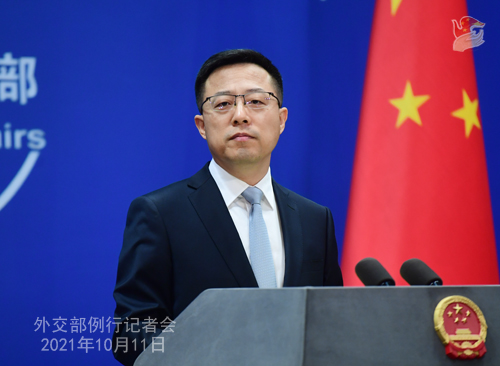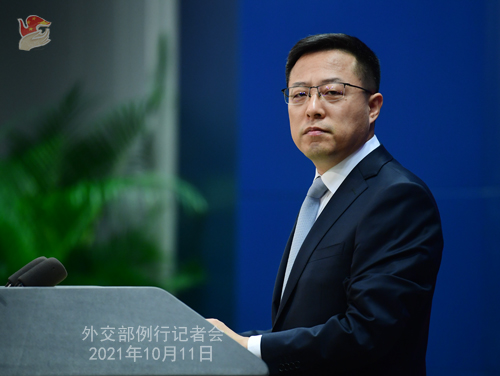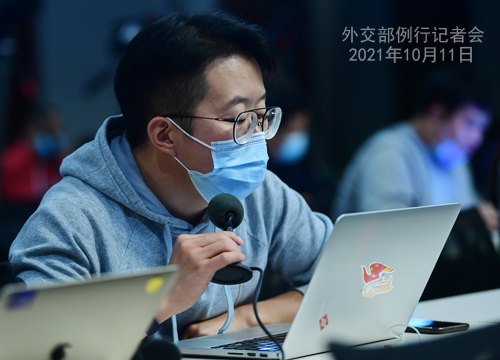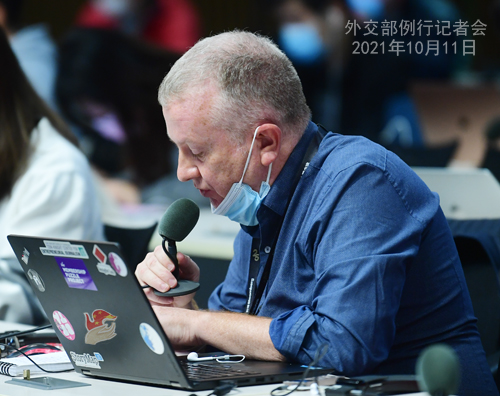
1.President of the G20 Italy plans to hold an extraordinary summit of the G20 on Afghanistan on October 12 via video link, Chinese President Xi Jinping's special envoy, State Councilor and Foreign Minister Wang Yi will attend the meeting.
2.State Councilor and Foreign Minister Wang Yi will attend the Sixth Meeting of the Ministers of Foreign Affairs of the Conference on Interaction and Confidence Building Measures in Asia (CICA) in Beijing on October 12 via video link.
The meeting will be held under the theme of "Security and Sustainable Development in Asia in New Realities of the Post-Pandemic World". State Councilor Wang and other heads of delegations will exchange in-depth views on issues including the current international and regional situation, cooperation on addressing security threats and challenges, post-pandemic economic development and CICA cooperation in various fields.
CCTV: On October 8, the 48th session of the Human Rights Council adopted the resolution on the negative impact of the legacies of colonialism on the enjoyment of human rights submitted by China. Can you tell us more about it?
Zhao Lijian: On October 8, the 48th session of the Human Rights Council adopted the resolution on the negative impact of the legacies of colonialism on the enjoyment of human rights submitted by China. The resolution recognizes that the legacies of colonialism, in all their manifestations, such as economic exploitation, inequality within and among States, systemic racism, violations of indigenous peoples' rights, contemporary form of slavery and damage to cultural heritage, have a negative impact on human rights, and stresses the importance of eradicating colonialism and addressing the negative impact of the legacies of colonialism on the enjoyment of human rights. Representatives of Russia, Pakistan, the Philippines, Eritrea, Venezuela, Cuba, Bolivia and other countries expressed appreciation for the draft resolution put forward by China in their statements, pointing out that the Human Rights Council should work on the legacies of colonialism, an issue that denies basic human rights, violates the UN Charter, and hinders world peace and development.
As we speak, the legacies of colonialism in various forms are still affecting world peace and development and having a serious negative impact on the enjoyment of human rights. The Human Rights Council, as the UN body responsible for promoting and protecting human rights, needs to pay attention to and discuss this issue. Relevant countries should implement the requirements of the resolution, take concrete measures to eliminate the negative impact of the legacies of colonialism, promote and protect human rights at home, and advance the sound development of the international human rights cause.
The Global Times: We learned that the Main Part of the Fifth Committee during the 76th Session of the UNGA began recently. Ambassador Zhang Jun, Permanent Representative of China to the UN, said at the meeting that China has made full payment of current UN peacekeeping assessments. Could you share with us more information?
Zhao Lijian: This year marks the 50th anniversary of the restoration of China's lawful seat in the United Nations. China's conviction in firmly upholding the UN-centered international system and supporting the important role of the UN in international affairs remains unchanged. Last month, President Xi Jinping attended the General Debate of the UNGA and made a key speech through video link, which sends a clear signal of China's support for the UN in playing a central role in international affairs and speaks volumes about the importance China attaches to and our support for the work of the UN.
As the largest developing country, a permanent member of the Security Council, and the second largest contributor to the UN regular budget and peacekeeping assessments, China, with a great sense of responsibility, has paid its share of UN budget and peacekeeping funds, and earnestly fulfilled its financial obligations to the UN. China recently has fully paid the assessments for all UN peacekeeping operations during the mandated period as of 31 December 2021 by the Security Council. Our real actions in practicing multilateralism has shown our support for the UN.
Defending the role of the UN requires all member states to take a responsible attitude and fulfill their due obligations. Major countries in particular should lead by example. UN governance won't be possible without the underpinning of a strong financial foundation. The worrying financial situations still facing the UN are mainly attributed to some members' refusal to pay their share of budget and peacekeeping assessments. Multilateralism is about concrete actions, not mere rhetoric. Relevant countries should pay their arrears and assessments in full, on time, and without conditions to enable the UN to carry out its work. It would be a concrete step to honor their commitment to multilateralism.

Maucau Monthly: Former Australian Prime Minister Tony Abbott made inappropriate remarks about China on several occasions during his recent visit to Taiwan. What is China's response?
Zhao Lijian: Adhering to the one-China principle is a universally recognized norm governing international relations. It is also the prerequisite and political foundation for the development of friendly relations between China and other countries. Relevant actions of certain Australian politician seriously violate the one-China principle and send a seriously wrong signal to the outside world. China is firmly opposed to this and has lodged solemn representations with the Australian side.
The remarks of certain Australian politician are completely confusing black and white and extremely absurd. Such remarks that incite confrontation, drum up the "China threat theory", grossly interfere in China's internal affairs and wantonly slander and smear China out of selfish political gain are immoral, irresponsible and find no support.
We urge relevant individuals in Australia to abandon the Cold War mentality and ideological bias, respect basic facts, view China and its development in an objective and rational way, and stop making irresponsible remarks.
Beijing Media Network: On October 8, Russian Foreign Minister Sergey Lavrov said that the US "is not hiding it and is straightforward" about pitting Russia and Europe against each other on gas issues, and that politicizing gas supplies should be avoided, or people on both sides would be adversely affected. What is China's comment?
Zhao Lijian: It is well-known that the Nord Stream 2 project shows energy complementarity between Russia and Europe, and would help resolve the European energy crisis. The US, however, to serve its own geopolitical interests and monopolize the European energy market, spares no effort in disrupting and hobbling relevant projects to undermine the interests of Russia and Europe and their cooperation. This wins no support. The US is adept at politicizing issues in all means and would hurt others indiscriminately, including its allies and partners, for its own interests. Such US practice is a reminder of what happened recently. The US colluded with the UK and Australia in forming the so-called AUKUS and egged on Australia to ditch the submarine cooperation project with France that had already begun. This was described as "a stab in the back" by the European side. We believe more countries, with their eyes wide open, will oppose the US hegemonic approach featuring politicization and a sense of supremacy in pursuit of self-interests at the expense of others.
Phoenix TV: It is reported that the US recently claimed that it has provided more vaccines around the world than every other country in the world combined, and that unlike China and Russia and others, the US is not asking a single thing in return. Do you have any comment?
Zhao Lijian: China always maintains that vaccines, as a powerful weapon in the fight against COVID-19, should benefit more people around the world as a global public good to the maximum extent. This is what we said and what we have been doing. So far, China has provided more than 1.4 billion doses of vaccines to more than 100 countries and international organizations, and will step up efforts to provide two billion doses to the world this year. On top of the US$100 million donation to COVAX, China will donate an additional 100 million doses of vaccines to fellow developing countries within this year.
In the meantime, we believe that fighting the pandemic is the shared responsibility of all countries. Countries that are strong in vaccine R&D and production, especially developed countries, should take concrete actions to fulfill their vaccine assistance commitments and increase the accessibility and affordability of COVID-19 vaccines in developing countries. This is an important manifestation of their responsibility as major countries.
As for the remarks made by the US side, I want to say that vaccines are used to prevent and curb the epidemics and save lives, and should not be used as a tool for political propaganda or selfish gains. It is hoped that the US could honor its vaccine aid promise at an early date, instead of offering a Barmecide feast to developing countries.

China News Service: What does China expect from tomorrow's meeting of CICA Ministers of Foreign Affairs?
Zhao Lijian: The Conference on Interaction and Confidence-Building Measures in Asia (CICA) is an important regional security dialogue and cooperation mechanism. Since its inception 29 years ago, CICA has made positive contributions to promoting peace and development in Asia as it conforms to the overriding trend of peace and development with commitment to enhancing mutual trust and coordination between countries.
Against the background of major changes and a global pandemic unseen in a century, countries in the region face pressing tasks of maintaining security and stability and promoting economic recovery. At this foreign ministers' meeting, China hopes that all parties will make full use of the platform, step up dialogue and communication, continue to implement a common, comprehensive, cooperative and sustainable security concept, jointly address various risks and challenges, practice true multilateralism, advance socio-economic recovery in all countries, reach more consensuses on upholding regional security and promoting common development and make greater contributions to building a community with a shared future for mankind.
AFP: With regard to the 13th round of China-India Corps Commander Level Meeting, China said India still insisted on unreasonable demands. Could you please clarify what are those "unreasonable demands" put forward by the Indian side?
Zhao Lijian: The spokesperson for the Western Theater Command of the People's Liberation Army already made a statement on the 13th round of China-India Corps Commander Level Meeting, and I would like to refer you to the relevant authorities for specifics.
Prasar Bharati: Regarding the 13th round of talks between India and China, a statement from Indian Army said that the Indian side made proposals for resolving the remaining areas, but the Chinese side was not agreeable and also could not provide any forward-looking proposals. What is the ministry's response to this? And, is this China's intention to make it as a new status quo which the Indian side said was caused by unilateral attempts of the Chinese side to alter the status quo of last year and which is in violation of bilateral agreements?
Zhao Lijian: As I just said, the spokesperson for the Western Theater Command of the People's Liberation Army (PLA) already issued a statement on the matter to clarify relevant facts and China's position. The remarks by the Indian side are groundless. During the 13th round of China-India Corps Commander Level Meeting, proceeding from maintaining the overall interest of the state-to-state and military-to-military relations between the two sides, the Chinese side made great efforts to ease and cool the border situation and fully demonstrated our sincerity. However, the Indian side still insisted on its unreasonable and unrealistic demands, which added difficulties to the negotiations. China is firm in its resolve to safeguard national sovereignty. It is hoped that the Indian side can avoid misjudging the situation, cherish the hard-won situation in the China-India border areas, abide by the relevant agreements and consensus reached between the two countries and two militaries, and show sincerity and take concrete actions to jointly safeguard peace and tranquility in the border areas with China.
The Paper: Recently, when commenting on the collision of a US nuclear submarine on October 2, Russian military expert Ivan Konovalov said that US ships and submarines deployed in the Asia-Pacific region often collide with various objects and civil vessels, causing casualties and drawing criticism about their professionalism. Do you have any comment?
Zhao Lijian: We have taken note of the concerns expressed by the Russian side. Earlier, China also expressed grave concern over the accident.
After this most recent incident, it took the US side five days to come up with a vague statement. Such irresponsible attitude and stonewalling and cover-up practice only make the international community more suspicious of the US intention and details of the accident. It is incumbent on the US to clarify the details of the accident and explain the following questions:
First, where exactly did the accident take place? Second, did the accident cause nuclear leakage and pollute the marine environment? Third, will this accident impact the navigation safety and fishery in the area where it took place?
The US side should take a responsible attitude, give a detailed account of what happened as soon as possible and make a satisfactory explanation to the international community and regional countries.

Bloomberg: I'd like to ask about an official from Bijie city, Guizhou Province, who has been commended by the state security officials for reporting illegal interviews by a foreign media outlet. This is according to some media reports including social media account run by the Beijing Daily. Can the foreign ministry offer more details about that?
Zhao Lijian: I don't have the specifics on what you mentioned yet and would like to refer you to relevant authorities.
What I want to stress is that China has always been committed to facilitating and helping foreign journalists in their interview and reporting work in China in accordance with laws and regulations. However, we firmly oppose ideological bias against China, acts violating the professional ethics and morality of journalism, and behaviors to malign and attack China by fabricating fake news and disinformation in the name of "freedom of the press".


